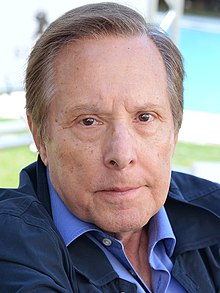
Back William Friedkin AN وليم فريدكن Arabic ويليام فريدكن ARZ Уільям Фрыдкін Byelorussian Уилям Фридкин Bulgarian উইলিয়াম ফ্রিডকিন Bengali/Bangla William Friedkin BS William Friedkin Catalan William Friedkin Czech William Friedkin Danish
William Friedkin | |
|---|---|
 Friedkin in 2017 | |
| Born | William David Friedkin August 29, 1935 Chicago, Illinois, U.S. |
| Died | August 7, 2023 (aged 87) Los Angeles, California, U.S. |
| Education | Senn High School |
| Occupations |
|
| Years active | 1962–2023 |
| Spouses | |
| Children | 2 |
| Signature | |
William David Friedkin (/ˈfriːdkɪn/; August 29, 1935 – August 7, 2023) was an American film, television and opera director, producer, and screenwriter who was closely identified with the "New Hollywood" movement of the 1970s.[1][2] Beginning his career in documentaries in the early 1960s, he is best known for his crime thriller film The French Connection (1971), which won five Academy Awards, including Best Picture and Best Director, and the horror film The Exorcist (1973), which earned him another Academy Award nomination for Best Director.
Friedkin's other films in the 1970s and 1980s include the drama The Boys in the Band (1970), considered a milestone of queer cinema; the originally deprecated, now lauded thriller Sorcerer (1977); the crime comedy drama The Brink's Job (1978); the controversial thriller Cruising (1980);[3][4] and the neo-noir thriller To Live and Die in L.A. (1985). Although Friedkin's works suffered an overall commercial and critical decline in the late 1980s, his last three feature films, all based on plays, were positively received by critics: the psychological horror film Bug (2006), the crime film Killer Joe (2011), and the legal drama film The Caine Mutiny Court-Martial (2023), released two months after his death. He also worked extensively as an opera director from 1998 until his death, and directed various television films and series episodes for television.
- ^ "The American New Wave: A Retrospective | H-Announce | H-Net". networks.h-net.org. Retrieved February 19, 2018.
- ^ "June 1977: When New Hollywood Got Weird". The Film Stage. June 21, 2017. Retrieved February 19, 2018.
- ^ "The Controversy of CRUISING | Cinematheque". cinema.wisc.edu. Retrieved February 19, 2018.
- ^ Guthmann, Edward (1980). "THE CRUISING CONTROVERSY: William Friedkin vs. the Gay Community". Cinéaste. 10 (3): 2–8. JSTOR 41685938.